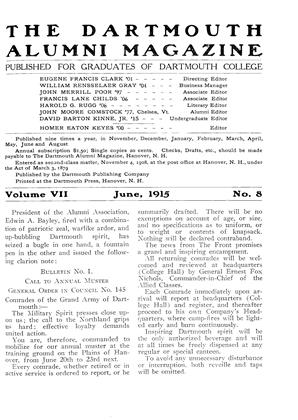One of the least understood and yet one of the most discussed phenomena of undergraduate life is the ever-recurrent chinning season, of vital interest to some fifty percent of the student body year, the inter fraternity council laboriously discusses the achievements and failures of past years, and each year new legislation either complicates the season beyond all power of human obedience, or so simplifies it that it is difficult to find a rv to break.
Of late years, Dartmouth has evidently begun to take the very sanest attitude toward the rushing activities of the fraternities: to allow them so far as possible to work out their own salvation. With this particular object in view, the inter fraternity council in 1914 adopted the so-called no-rule season, whereby a fraternity is enabled to pledge a freshman at any time after his matriculation. This season, with its lack of embarrassing rules, of course allows individual fraternities to take their own time for issuing invitations, and in fact, freshmen were pledged continuously from September until May. When the discussion of a season again came before the council in May, it adopted quite unanimously the norule season for this fall, with the recommendation that chapters proceed slowly in the rushing of men during the entrance examination period.
The difficulty with such a season, as The Dartmouth has pointed out editorially, is the inevitable rush of some fraternities to pledge available men immediately—or before some other organization has discovered them. This haste cannot result in other than bad results in choices, both for the freshmen and for the fraternities. There is a strong movement among the fraternities now toward greater deliberation —a deliberation, to be sure, not compelled by any rules, but by the ordinary workings of common sense.
"If the College sees another year of lottery-rushings," says The Dartmouth, "it will be because there are no fraternities with the moral courage to act in a manner which they know is right, and which in the end would be profitable. Deliberation may perhaps allow an alleged prodigy to fall to the wiles of unscrupulous neighbors, but it will insure against the acceptance of the possibility who appears upon acquaintance to be forever impossible. A fraternity can survive the loss of a whale or two, but it is very near ruin to be tied up to an array of sheeps-heads and jellyfishes."
 View Full Issue
View Full Issue
More From This Issue
-
 Article
ArticleQUERIES OF AN ALUMNUS AS TO THE TENDENCIES OF UNDERGRADUATE LIFE AT DARTMOUTH
June 1915 By Henry L. Moore '77 -
 Article
ArticleTHE DARTMOUTH COLLEGE ETHNOLOGICAL COLLECTION
June 1915 By Charles H. Hawes -
 Article
ArticleMEETING OF TRUSTEES
June 1915 -
 Class Notes
Class NotesLOCAL ASSOCIATIONS
June 1915 -
 Class Notes
Class NotesLOCAL ASSOCIATIONS
June 1915 -
 Article
ArticlePresident of the Alumni Association
June 1915







